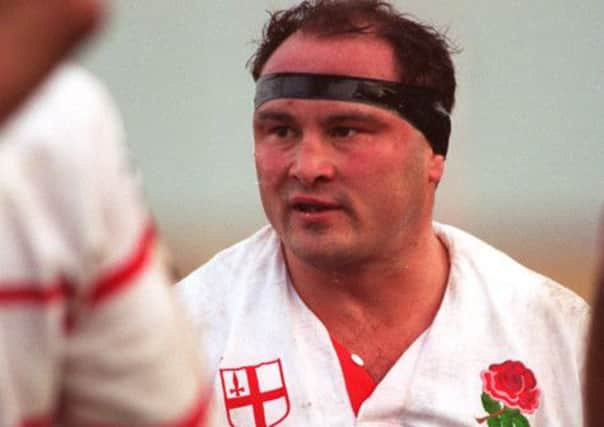Old Crocs proved crucial to Moore’s education


It was in the late Seventies, when Brian Moore was dividing his union education between a captain’s role for the Crossley and Porter School in Halifax on a Saturday morning, and a place in the front-row of the Old Crossleyans senior team in the afternoon.
On one bitingly cold autumn day, Moore left his schoolmates behind to link up with the adults to whom he was attempting to prove his worth.
Advertisement
Hide AdAdvertisement
Hide AdCrocs’ opponents that day were Selby, a team which introduced Moore to a more agricultural form of scrummaging.
“We played Selby at a time when the old pits were still open and the Selby front-row were all miners,” laughs Moore.
“They were unbelievably strong and I remember thinking then that this was a real introduction into front-row play.
“It was very basic play, but some of the toughest I remember, and for me, as a 17-year-old, that really stood out.
Advertisement
Hide AdAdvertisement
Hide Ad“We had a great side. We went the whole season unbeaten in the Yorkshire Post merit table, which was quite something.
“Several games stand out from my time with Old Crossleyans, but that one against Selby...”
The following year, Moore moved to Roundhay where he continued his progression to what would eventually become spells with Nottingham, Harlequins and Richmond, 64 England caps between 1987 and 1995, and two tours with the British and Irish Lions.
His was a common path to international honours, one long gone since the dawn of professionalism, which has brought higher standards, greater credibility for the sport and better health and safety procedures – but not necessarily bigger characters.
Advertisement
Hide AdAdvertisement
Hide Ad“Both those spells were very important because it gave me an introduction into rugby,” says Moore.
“This is one of the problems with academies at clubs nowadays. There are strict rules on who you can play against.
“I understand why that is, for safety reasons maybe, but for me, as a 17-year-old playing against three grown, fully-developed blokes in the front-row, this was a very steep and effective learning curve.
“I learned a hell of a lot in just one year at Crossleyans.
“And then when I stepped up to Roundhay there were some very good players again; Andy Mason who went to rugby league, Roger Burman, Dick Aspey, Ray Rowett.
Advertisement
Hide AdAdvertisement
Hide Ad“The way the game was with sides like Broughton Park, Waterloo, the northern clubs were stronger than they are now.
“It was huge for me and I learned more in those two years in Yorkshire than any time after. The learning curve flattened out afterwards, but it was a great time and they were both great clubs.
“I think the teenagers of today are missing out on those experiences in the academy structure.
“But I just don’t see any way around it. It’s the price they pay for being professionals.
Advertisement
Hide AdAdvertisement
Hide Ad“They get paid to do their job. I understand that, and that’s the trade-off.
“The good news is that it’s only a very small percentage.”
Moore accepts that academies serve a purpose in the professional era, harnessing talent and preparing those players for the full-time environment.
But what those maturing young men miss out on is the social element that makes rugby so encompassing.
Moore was speaking at the launch of his latest book, What Goes on Tour, Stays on Tour, in which tales from his junior tours with Yorkshire’s clubs feature alongside those involving household names with whom he shared journeys as a British Lion.
Advertisement
Hide AdAdvertisement
Hide Ad“Professional players nowadays go to school, they get picked up by academies, they go straight into squads and so on,” says the Halifax-raised pundit.
“They don’t play junior rugby, they don’t play Colts rugby and for them, what is quite normal in junior clubs; the songs, the chants et cetera, is completely unknown to the new breed of pro.
“The book explains to pro players what it’s like to go on a junior tour like I did with the Old Crossleyans many years ago, where you turn up at the car park and there’s a tour jester appointed, you might have tour t-shirts and tour rules that are as silly as possible.
“It’s also a book that tells amateurs how the pros do it, but no one should take it too seriously.
Advertisement
Hide AdAdvertisement
Hide Ad“Players now are on a strict pathway from a very early age.
“Their nutrition, which includes very little drinking, is completely the opposite to junior players.
“They are professionals, they are trying to earn a living out of the sport and you can’t do as much as you would at the junior level, which on the one hand gets you more money but on the other, is a shame because the vast majority of people who do play are not professionals.
“The number of people playing rugby who are amateurs must be 99 per cent.
“For them rugby is the binding sport around which their social life is lived and a lot of fun can be had.”
What Goes on Tour, Stays on Tour by Brian Moore, published by Simon and Schuster, £18.99.